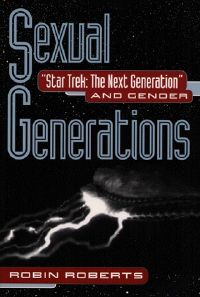Sexual Generations: Star Trek: The Next Generation and Gender
Das Buch Sexual Generations: Star Trek: The Next Generation and Gender beschäftigt sich aus Sicht der Gender Studies mit der Serie Raumschiff Enterprise: Das nächste Jahrhundert.
Inhalt[Bearbeiten]
- Vom Umschlagtext:
Boldly going where no one has gone before, Robin Roberts forges intriguing links between feminist politics and theory and the second Star Trek series, Star Trek: The Next Generation.
This lively discussion demonstrates how science fiction's ability to make the familiar strange allows Star Trek to expose and comment on entrenched attitudes toward gender roles and feminist issues. By having aliens or sexually neutral beings enact female dominance or passivity, experience pregnancy, maternity, or abortion, or suffer rape or domestic violence, Star Trek provides viewers with an antidote to cultural biases that may be recognized or subconscious. Through the displacements of science fiction, Star Trek: The Next Generation reveals double standards, destructive behavior, and culturally sanctified excuses for sexual inequality and also suggests resolutions and forms of resistance that may be overlooked because of conditioned bias.
Roberts maintains that the relevance of Star Trek: The Next Generation to feminist issues accounts as no other factor can for the program's huge following of female fans. The incisive and innovative readings in Sexual Generations show how th final frontier can clarify pressing questions of our own space and time.
"Roberts is a superb explicator of Star Trek: The Next Generation, offering stunning analyses of the figures of the female ruler, the perfect female mate, the female alien as a reworking of the story of the tragic mulatto, and the antiromance perspective of the rape episodes." -- Jane Donawerth, author of Frankenstein's Daughters: Women Writing Science Fiction
"On the most ambitious levels Roberts is arguing for a truly 'high art' forged out of gender theory and the highly popular Star Trek episodes. But it is not only high art she is talking about; it is the cultural history of our century. Thus she is able to talk believably about space as a female enterprise a hundred years after Frederick Jackson Turner talked about the frontier in terms of trade and economics." -- Donald Hassler, author of Comic Tones in Science Fiction
